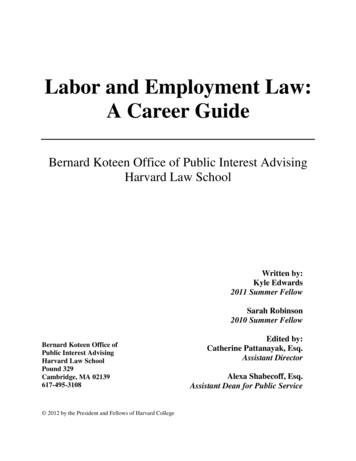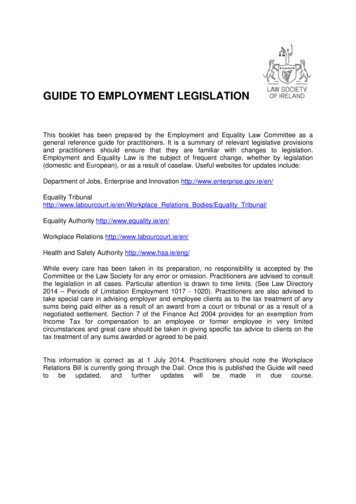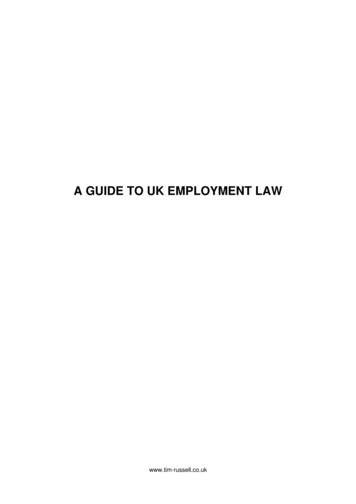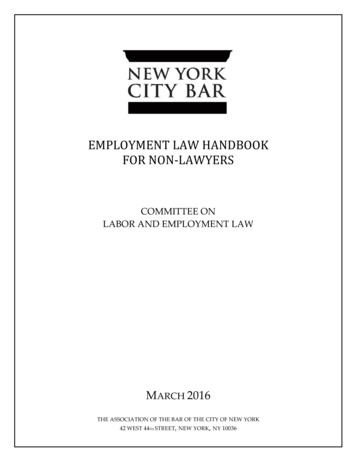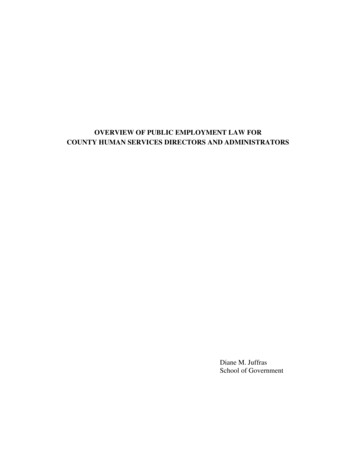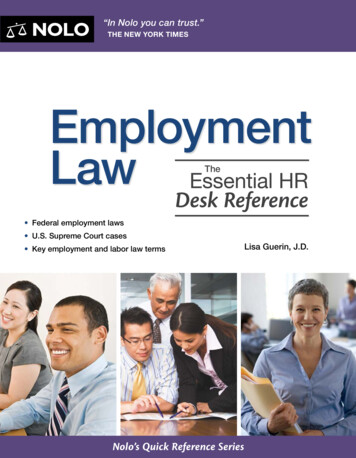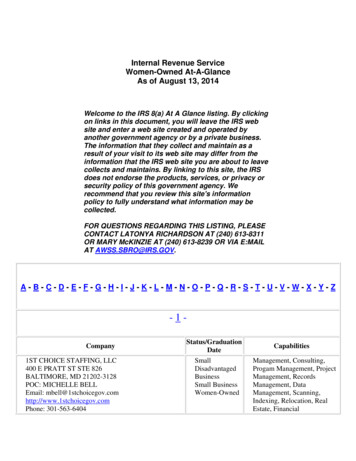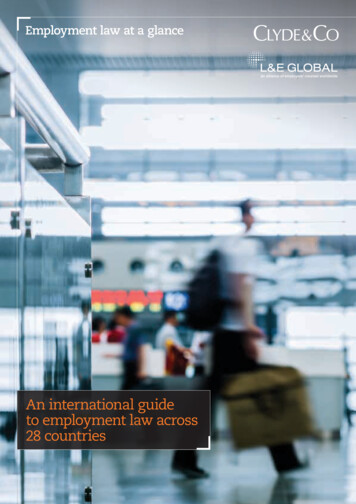
Transcription
Employment law at a glancean alliance of employers’ counsel worldwideAn international guideto employment law across28 countries
An international guide to employmentlaw across 28 countriesIntroduction1Europe 24Luxembourg28The n52Switzerland56UK60MENA highlights64Libya66Saudi Arabia70Qatar74UAE80APAC highlights84Australia86China90Hong Kong94India100New Zealand104Singapore108The Americas andCanada highlights114Brazil116Canada122Mexico126USA130
IntroductionIn today’s global economy all international businesses need advice that offersintegrated solutions to their global employment issues, particularly when theyare working across jurisdictions and juggling different regulatory requirements.Clyde & Co’s employment team are recognised leaders in the delivery of HRlegal services. Our experienced employment practices in the UK, the MiddleEast and across Asia Pacific have a long track record of advising both localand international businesses on employment issues, employee benefits andimmigration law.In 2016, Clyde & Co became the official UK affiliate member of L&E Global,an international alliance of law firms which specialise in labour relations,employment and immigration law and employee benefits.Clyde & Co has been working with members of L&E Global since the network’sinception in 2011 but has now formalised this relationship by becoming anaffiliate member. Together, we can provide our clients with the most effectiveand efficient global HR legal support available in the market.Our technically excellent advice is clear, concise and straightforward. We focuson anticipating potential issues and offer creative, timely and constructivesolutions. We don’t sit on the fence - we will give you an opinion. We also makeit our business to understand your priorities and commercial pressures so wecan ensure that your expectations are met.This guide gives you a brief outline of the employment law regime across thekey jurisdictions covered by L&E Global and Clyde & Co. If you would like anymore details about these or any other countries, please contact:Robert HillClyde & CoT: 44 (0)20 7876 6214E: robert.hill@clydeco.comJeroen DouwesL&E GlobalT: 31 2 0344 6100E: jeroen.douwes@leglobal.org1
Europe highlightsEuropean UnionAustria–– EU employment law protects the rights of workersacross the EU. However, these laws often operatedifferently in different member states as most EUemployment law is created at EU level and is thenbrought into national law by each member state–– Non-EU nationals must obtain an employment permit,a work permit, and an exemption certificate or aRed-White-Red card to work legally in Austria–– Areas covered by EU law include:–– Working time, part-time and fixed-term work–– Legislation regulates basic employment protectionand entitlements, and practically every employer andemployee is subject to a collective bargaining agreement–– Protection from discrimination, the protectionof pregnant workers and equal pay rights–– There is no national minimum wage but salaries mustcomply with collective bargaining agreement provisionsregarding industry-wide minimum salaries–– Informing and consulting workers on workplaceissues, including collective redundancies andbusiness transfers–– Austrian law does not restrict terminating employmentto specific conduct or causes.–– Protection of employees’ rights on a business transfer–– Protection of personal data–– Although the termination procedure differs for blueand white collar workers, Austria is moving towardsunifying these proceduresBelgium–– All labour documents and labour-relatedcommunications with employees must be in Dutch,French or German, depending on the location of theemployer’s operating unit–– The notice period regime, which applies to blue andwhite collar workers, is based solely on length of service–– Employer notice periods in Belgium are lengthy for longserving employees – e.g. employees with eight years’service are entitled to 27 weeks’ notice and with 17years’ service, to 54 weeks’ notice–– Well-being and anti-discrimination laws have greatimportance in Belgian labour relations, in particularin relation to the treatment of psychosocial risks inthe workplace2
FranceItaly–– Usually, employees work 35 hours a week. Only hoursworked at the request of the employee‘s superior willbe regarded as overtime–– From 2015, new recruits gain gradual protection,directly linked to their length of service–– French employment law offers wide powers to“representative” trade unions and also to elected staffrepresentative bodies–– For indefinite term contracts, there must be real andserious grounds for dismissal – there are two typesof valid grounds: personal and economic–– Severance payments are only awarded if the employeehas the minimum required length of service and thisis provided for in the relevant collective bargainingagreement–– New guidelines for awarding unfair dismissal damageshave recently been introducedGermany–– Employees who are not from the EU/EEA require aresidence title and work permit–– A statutory minimum wage of EUR 8.84 per hourgenerally applies to all employees in all sectors ofbusiness. Aside from the statutory minimum wage,there are special regulations and collective bargainingagreements within certain sectors–– Overtime pay is not expressly regulated by law, butis subject to the employment agreement, collectivebargaining agreements and works council agreements–– Trade union representatives support employees andworks councils, but do not have participation rightswithin a company. However, works councils havefar-reaching co-determination rights, which limitthe employer’s rights to unilaterally executecertain measures–– For each industry sector, there is a National CollectiveBargaining Agreement that regulates the employmentrelationship–– Poor performance is not a statutory reason for dismissal–– The grounds of dismissal must be given in the terminationletter; failure to do so renders the termination invalid–– Reinstatement is no longer the sole remedy for unfairand wrongful dismissal; this has largely been replacedby an award of damages, calculated on the basis oflength of serviceLuxembourg–– The labour market in Luxembourg is characterised bythe number of commuters from Belgium, France andGermany, which represents over 50% of the labour force–– The Labour Code came into effect on 1 September 2006and regrouped all existing employment rules–– The termination of contracts is strictly regulated by theLabour Code with specified notice periods depending ofthe employee’s length of service–– The right of workers to strike is implicitly guaranteedby the Constitution under the freedom of associationbut is only possible under specific conditions. A peaceobligation exists for the duration of a collective labouragreement. Moreover, to be legal, every strike or lockoutmovement must first be referred to the National Officeof Conciliation–– Overtime is strictly regulated and is only permitted withprior authorisation from, or notification to the Ministerfor Employment–– Due to the high level of protection against dismissal, itis reasonably common for employees to challenge theirdismissal in court, where the parties often agree ontermination on the basis a severance payment is made3
Europe highlightsThe NetherlandsPoland–– The maximum probationary period is two months–– Given its low personnel costs, Poland is currentlyEurope’s main outsourcing hub–– In 2015, a number of legislative provisions wereintroduced, making it increasingly difficult todismiss employees which has led to more settlementagreements being used–– Employees with at least two years’ service areusually entitled to a payment on termination, whichamounts to approximately 1/3 of a month’s salary foreach year of service–– Overtime is only permitted in certain circumstances–– Fixed-term contracts have become more widelyused recently–– In the case of large employers, trade unions areactive and have a strong presence–– In most cases, employers cannot terminate anemployment contract without seeking permissionfrom the Employee Insurance Agency or applying tothe sub-district courtRomania–– New rules for fixed-term contracts apply, includingthe use of non-competition clauses and a paymentequal to one month’s salary on termination–– Most disputes involve financial claims fromemployees, usually for overtime payments, workingconditions, bonuses etcNorway–– Employers often face collective actions by employeeswhich are usually initiated by unions–– Norway adopts most EU labour law legislation as partof the so-called EEA-Agreement with the EU–– In some respects, the law in Norway is even moreemployee-friendly than EU legislation, such as therules governing business transfers–– There is no statutory minimum wage, but wageprovisions can be set by collective agreements–– There are a number of restrictions on fixed-termcontracts, including the length of the term andthe number of employees in the workforce onfixed-term contracts–– Employees may not be dismissed unless it is objectivelyjustified on the basis of circumstances relating to theundertaking, the employer or the employee4–– The Polish tax and social security system isever-evolving–– There has recently been a steady rise in the numberof independent contractors–– Employers have the right to regulate working hoursbut special legal provisions, which are usuallystricter than the EU rules, limit this right–– Great importance is given to the form of thedocuments drafted by the employer. Courtcases usually involve verifying the form of thesedocuments and a large number of decisions arebased only on this issue–– Collective negotiation is mandatory for companieswith more than 21 employees however this doesn’tnecessarily have to result in a collective agreement
SpainSwitzerland–– In principle, employment contracts are presumed tobe for an indefinite term. There are, however, a limitednumber of fixed-term employment contracts–– Compared with other jurisdictions, Swiss employmentlaw is employer-friendly–– In most cases the probationary period cannot exceedtwo months–– There is a limit to the number of non-EU and non-EFTAnationals who are permitted to work as managementlevel employees or specialists in Switzerland–– Freedom of association and representation arefundamental rights under the Spanish Constitution–– Switzerland has stable labour relations and strikesare rare–– Termination can be based on objective or disciplinarygrounds–– If employees work overtime in excess of the statutorylimit (45 or 50 hours, depending on the category ofworker) the employer must pay them a supplementof 25% of their hourly wage–– Dismissals are null and void if the termination isdiscriminatory or involves protected employeesSweden–– Probationary periods and fixed-term employment arepermitted, provided certain requirements are met–– Approximately 70% of employees in Sweden aremembers of a trade union–– Although there is no national minimum wage, collectivebargaining agreements usually provide for minimumsalary levels and annual minimum salary increases–– Positive discrimination: employers can choose acandidate because of their gender if they are seekingto redress a gender imbalance in the workforce or in aparticular position, provided the candidate is equally, oralmost equally, qualified for the job as theother candidates–– In principle, employers may terminate an employmentrelationship for any reason but employees havea statutory right to request written reasons fortheir dismissalUK–– Termination of employment is process-driven so thatif the right procedure is followed, liability can usuallybe avoided–– Discrimination and whistleblowing laws provide ahigh degree of protection in the workplace; claims arefrequently brought in the tribunals and compensation isbased primarily on financial loss (with no cap), althoughthere aren’t any punitive damages–– Although union representation is declining, workplacerepresentation is becoming more common, but isgenerally not problematic for employers–– Women are entitled to take one year’s maternityleave, and this leave can be shared with their partner;maternity pay can also be shared but is limited to 39weeks, capped at GBP 140.98 except for the first six weeks–– Gender pay reporting rules for companies with at least250 employees are in force from April 20175
AustriaLike most EU Member States, Austria’s approachto employment policy fosters a legal environmentthat provides broad protection and rightsfor employees. The legal regime comprises acomplex combination of overlapping EU andAustrian legislation, broad collective bargainingagreements, shop-floor agreements, andindividual employment agreements.The different classifications of employees aredefined by statutory provisions, but althoughthese formal distinctions still exist on paper,they are slowly losing their significance as Austriamoves towards unifying its laws in respect of blueand white collar employees. However, employershave consistently resisted change becauseextending white collar employees’ rights wouldresult in increased costs for employers.6
Issues arising on hiringindividualsImmigrationIn order to work legally in Austria, a foreign national (whois not an EEA-national) must comply with the EmploymentAct 1975 and obtain an employment permit, a work permit,an exemption certificate or a Red-White-Red card.An Austrian employer may recruit a foreign national foremployment in Austria, but the individual must apply forapproval and an employment permit from the regionalemployment office. This employment permit allows aforeign employee to work in the specifically designatedposition for the specified employer for a maximum periodof one year. The employment office will decide whether toissue the employment permit based on three criterions:(1) an analysis of the current labour market, and whetherthe mark
This guide gives you a brief outline of the employment law regime across the key jurisdictions covered by L&E Global and Clyde & Co. If you would like any more details about these or any other countries, please contact: Robert Hill Clyde & Co T: 44 (0)20 7876 6214 E: robert.hill@clydeco.com Jeroen Douwes L&E Global T: 31 2 0344 6100

